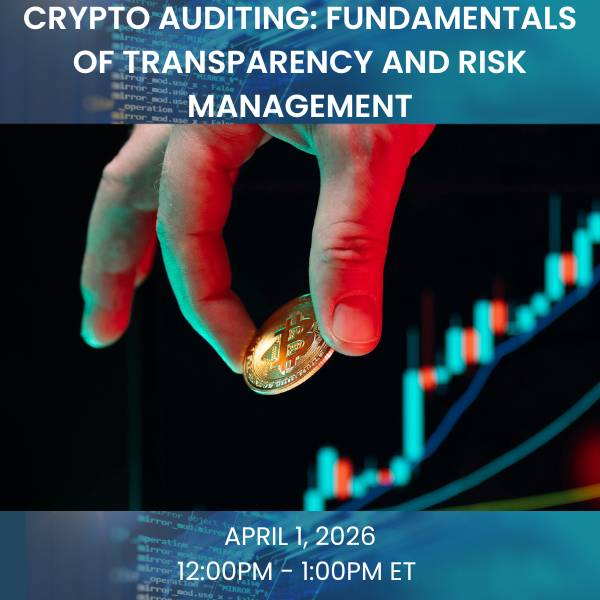 Image 1 of 1
Image 1 of 1


Crypto Auditing: Fundamentals of Transparency and Risk Management
📅Date: 4/1/2026 ⏱️Duration: 60 minutes
📊Expertise Level: Intermediate
Description: As digital assets become more mainstream, regulators and financial institutions are tightening expectations around transparency and risk management. This course introduces professionals to the essentials of crypto auditing, including how to evaluate blockchain transactions, verify ownership and reserves, and assess the integrity of crypto operations. Participants will learn how traditional audit principles apply to the decentralized ecosystem and how to identify potential risks related to AML, fraud, and data integrity.
Who This Is Designed For: Auditors, compliance officers, risk managers, and fintech professionals seeking to understand how to audit crypto activity effectively and align with evolving regulatory standards. No prior blockchain expertise is required—just curiosity and an interest in learning how auditing applies to digital assets.
Agenda:
Introduction to Crypto Auditing: Understand how blockchain impacts traditional auditing methods.
Audit Planning and Scoping: Identify high-risk areas such as wallets, exchanges, and custody models.
Verification Techniques: Learn how to confirm ownership, reconcile reserves, and track transactions on-chain.
Risk Indicators: Recognize signs of potential fraud, wash trading, or illicit flows.
Reporting and Assurance: Explore how to document findings and communicate results to regulators or partners.
By the end of this course, you will know how to:
Evaluate the accuracy and transparency of crypto transactions.
Apply audit principles to blockchain-based financial systems.
Detect irregularities and potential AML/fraud risks in crypto data.
Prepare clear audit reports aligned with regulatory expectations
Note: This program meets the eligibility criteria for continuing education under ACFCS and is eligible for 1 credit.
📅Date: 4/1/2026 ⏱️Duration: 60 minutes
📊Expertise Level: Intermediate
Description: As digital assets become more mainstream, regulators and financial institutions are tightening expectations around transparency and risk management. This course introduces professionals to the essentials of crypto auditing, including how to evaluate blockchain transactions, verify ownership and reserves, and assess the integrity of crypto operations. Participants will learn how traditional audit principles apply to the decentralized ecosystem and how to identify potential risks related to AML, fraud, and data integrity.
Who This Is Designed For: Auditors, compliance officers, risk managers, and fintech professionals seeking to understand how to audit crypto activity effectively and align with evolving regulatory standards. No prior blockchain expertise is required—just curiosity and an interest in learning how auditing applies to digital assets.
Agenda:
Introduction to Crypto Auditing: Understand how blockchain impacts traditional auditing methods.
Audit Planning and Scoping: Identify high-risk areas such as wallets, exchanges, and custody models.
Verification Techniques: Learn how to confirm ownership, reconcile reserves, and track transactions on-chain.
Risk Indicators: Recognize signs of potential fraud, wash trading, or illicit flows.
Reporting and Assurance: Explore how to document findings and communicate results to regulators or partners.
By the end of this course, you will know how to:
Evaluate the accuracy and transparency of crypto transactions.
Apply audit principles to blockchain-based financial systems.
Detect irregularities and potential AML/fraud risks in crypto data.
Prepare clear audit reports aligned with regulatory expectations
Note: This program meets the eligibility criteria for continuing education under ACFCS and is eligible for 1 credit.

